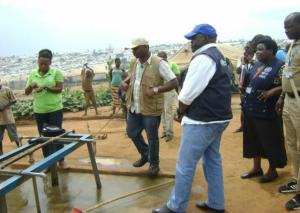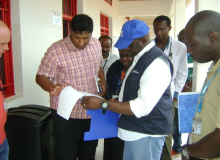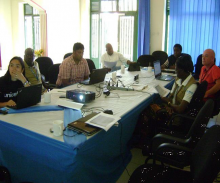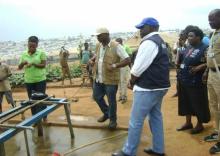WHO, UNHCR and UNICEF conduct 2nd joint field visit to Mahama Refugee camp in Rwanda to monitor the on-going Typhoid Fever control measures
11 February 2016 - Since late April 2015, nearly 234,606 Burundians fled to neighbouring countries as a result of the on-going political crisis in the country. As of 20th January 2016 Rwanda registered 71,881 refugees and a total 45,460 are hosted in Mahama camp in Kirehe District, Eastern Province.
In November 2015, a Salmonella Typhi outbreak was confirmed, affecting the population of the camp. The Ministry of Health, UNHCR, WHO and implementing partners on the field responded to the outbreak to halt the transmission among the refugees and neighbouring communities around the camp. Disease surveillance, case management, health and hygiene promotion, water and sanitation were strengthened to control and contain the outbreak.
To date, 1,474 suspected cases were reported and 46.2 %( 12/26) of blood cultures performed were tested positive for Salmonella Typhi.
Given the persistence of the active transmission, WHO, MOH and UNHCR decided a regular joint field visit to assess, monitor and supervise the on-going control measures, identify and address gaps and challenges.
The 1st visit was conducted on 5th January 2016 and several recommendations were made to improve the surveillance, the cases management and the water and sanitation.
On 21st January 2106 the 2nd joint field visit was carried out to monitor and supervise the implementation of the recommendations made during the first visit. During the visit, the partners present which included WHO, UNHCR, UNICEF, MIDMAR and other implementing partners reviewed the status of the recommendations and afterward conducted a joint tour of the camp and its health, WASH and community facilities.
The team visited the two Health Centres, two community markets and several water points in the camp. At the time of the visit, the water quality testing was supervised at various water point and household level.
The team members were delighted about the significant improvement in the general situation in the camp and made additional recommendations aimed ensuring water safety at household level, continuous improvement, monitoring of water quality and reporting were discussed at a joint meeting held in UNCHCR conference room chaired by WHO Country Representative.
At the end of the mission, Ms Pascasie Mukansonera , the MIDIMAR administrative assistant to the Camp Manager in charge of health and nutrition, highlighted the importance of regular monitoring and supervision and commended the efforts of the partners to respond to the outbreak. Dr Louis Martin Diouf and Dr Lakruwan Dassanayake, Public Health Officer, UNHCR, pledged their continuous coordination and support to the implementing partners to fill the remaining gaps.
The WHO Country Representative to Rwanda, Dr. Olushayo Olu, commended the efforts of the implementing partners and encouraged them to ensure the sustainability of the achievements. The next joint supportive supervision visit was fixed for 4th February, 2016.
_________________________________________________
For further information, please contact:
Dr Olushayo Olu, oluo [at] who.int (oluo[at]who[dot]int)
Dr Jose Nyamusore, josnyamusore [at] gmail.com (josnyamusore[at]gmail[dot]com)
Dr Marie Rosette NAHIMANA, rosettelady [at] gmail.com (rosettelady[at]gmail[dot]com)
_________________________________________________
Below:
1. WHO Representative verifying medical records at Health Center
2. Meeting for recommendations review
3. Visit and water testing at water point






